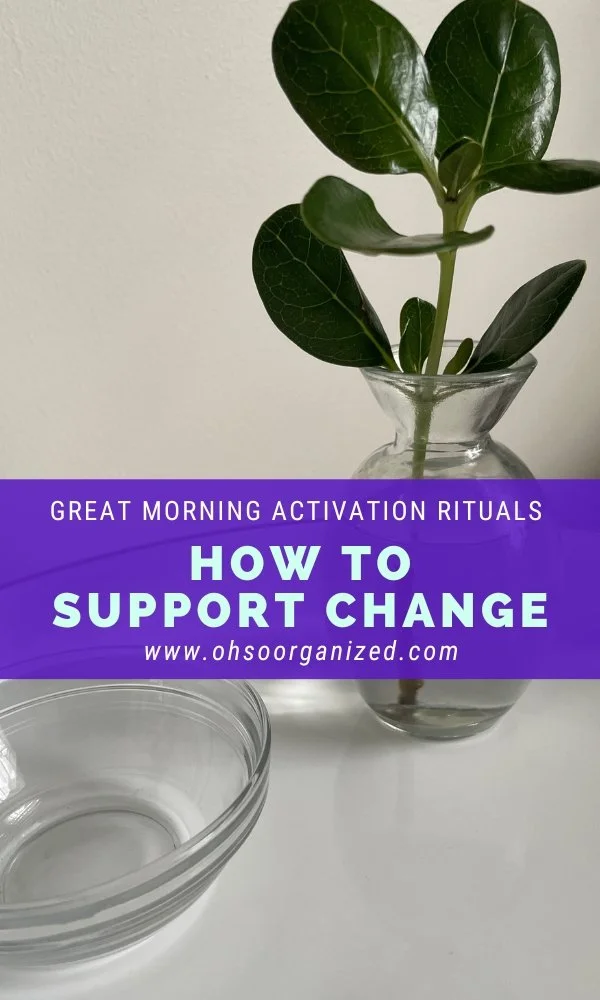Enjoy the newest release (v49) of the “What’s Interesting?” feature with my latest finds that inform, inspire, and relate to organizing and life balance. These unique letting-go discoveries reflect this month’s blog theme and time of year. Spring is a season for growth, change, and letting go of what no longer serves you.
You are an engaged, vibrant, and generous group. I am deeply grateful for your ongoing presence, positive energy, and contributions to this community. I look forward to your participation and additions to the collection I’ve sourced.
What do you find interesting?
What’s Interesting? – 5 Best Letting Go Discoveries
1. Interesting Workshop – Letting Go of Clutter
Do you feel burdened and overwhelmed by the clutter in your life? This transformative workshop can help. Spring is a wonderful time to let go and thrive.
Join me, Linda Samuels, Professional Organizer, for the empowering workshop – My Simple Organizing Plan. One workshop with your choice of two dates:
April 22nd at 7:00-8:00 pm Eastern or
April 24th at Noon-1:00 pm Eastern
By the end of the one-hour Zoom workshop, you’ll have strategies for immediate change. You will:
Uncover the hidden impact of clutter on your emotional well-being.
Learn how to harness motivation to propel your decluttering journey forward.
Acquire the skills to design a simple, personalized decluttering plan tailored to you.
Let go of the chaos and say hello to a calmer, more organized you. Reserve your spot now!
2. Interesting Article – Letting Go for Spring
Have you ever chosen a decluttering, letting go, or organizing project based on your Zodiac sign? Are you curious about which project aligns best with your sign? If so, you’ll love this!
In the Homes & Gardens article, What to easily organize this spring based on your Zodiac sign – it’ll turbocharge decluttering and banish motivation blockers, writer Ciera Cree explores star sign-adjacent organizing projects based on recommendations from astrologers and professional organizers (including me).
Ciera shares the astrologers’ advice and says, “Aligning your decluttering mission with your star sign will maximize efficiency...” For example, if you’re an Aries (March 21st – April 19th), astrologist Rebecca Gordon suggests doing a “closet refresh.”
Based on Rebecca’s advice, I suggested, as a professional organizer, “To get your closet ready for spring, begin by removing darker, heavier clothing to make space for lighter, more colorful seasonal pieces.”
What is your sign? I’m a Scorpio. The astrologer suggests organizing my to-do list for spring home maintenance tasks. Which spring decluttering and letting go project are you looking forward to?
3. Interesting Read – Letting Go of Overwhelm
Feeling overwhelmed is the top reason people reach out to me for support. Their overwhelm comes from having:
Too much clutter
Too many projects and people to manage
Unwieldy to-do lists
Lack of time or
Inability to focus on what’s valued most
In Overwhelmed – Work, Love, and Play When No One Has the Time, author and award-winning journalist, Brigid Schulte explores why we’re so stressed out and overwhelmed and ways to create time for what matters most.
Schulte shares neuroscience research that “when a human is pressed for time, rushed, and caught up in overwhelm, that yellow blob [prefrontal cortex] does something alarming: It shrinks.” In addition, “when children are exposed to stress – often stemming from the overwhelm of their parents – it can alter not only their neurological and hormonal systems but also their very DNA.”
This is sobering stuff. However, it’s not all doom and gloom. Schulte also provides readers with compelling research, stories, and many strategies. She advocates for:
Letting go of unrealistic expectations
Creating flexible work schedules
Establishing parenting and domestic parity
Setting technology boundaries
Slowing down
Having more leisure time
Practicing gratitude
Playing more
Embracing ‘good enough’
Taking intentional breaks
Focusing on the present
What can you reimagine or let go of when you're feeling overwhelmed?
“Let go of the chaos and say hello to a calmer, more organized you.”
4. Interesting Resource – Letting Go to Help Someone Else
As you declutter and let go this spring, do you have bras you no longer wear that could benefit someone? Finding a good home for your belongings is a helpful strategy for letting go. You’ll feel better and more at peace when your things go to someone who will appreciate receiving them. In the organizing industry, this is known as providing “safe passage.”
A terrific non-profit organization, The Bra Recyclers, repurposes old bras and new underwear and gives them to people in need. Repurposing also keeps textiles out of landfills.
They accept regular bras, sports bras, nursing bras, and new ones with tags or women’s panties and men’s boxers and briefs in the package. With their “hassle-free solution,” The Bra Recyclers makes it easy to get your undergarments to them with this three-step process:
Wash it
Fill out the online form
Mail or drop it off
Let go to help people and the planet.
5. Interesting Thought – Letting Go of What’s Keeping You Stuck
What is holding you back? What is keeping you stuck? What is no longer necessary in your life?
If you sense it’s time to let go, give yourself permission. Close your eyes and settle. Take a deep breath, hold it briefly, exhale slowly, and let it go. Repeat two more times.
Can you identify a part of your life that needs help letting go? It could include physical items, negative thoughts, overly busy schedules, or unhelpful habits.
How will you benefit from letting go?
New Season Inspires Letting Go Opportunities
When you release what is no longer needed, you make space for possibilities, calm, and what’s most valued.
What will you let go of this spring? Which of these discoveries resonate most with you? I’d love to hear your thoughts and invite you to join the conversation.
How Can I Help?
Do you want help getting unstuck, reducing overwhelm, letting go, and getting organized? I’m here to help. Virtual organizing is an extraordinary path forward – local feel with global reach.
Please email me at linda@ohsorganized.com, call 914-271-5673, or schedule a Discovery Call. Letting go is possible, especially with support.


















